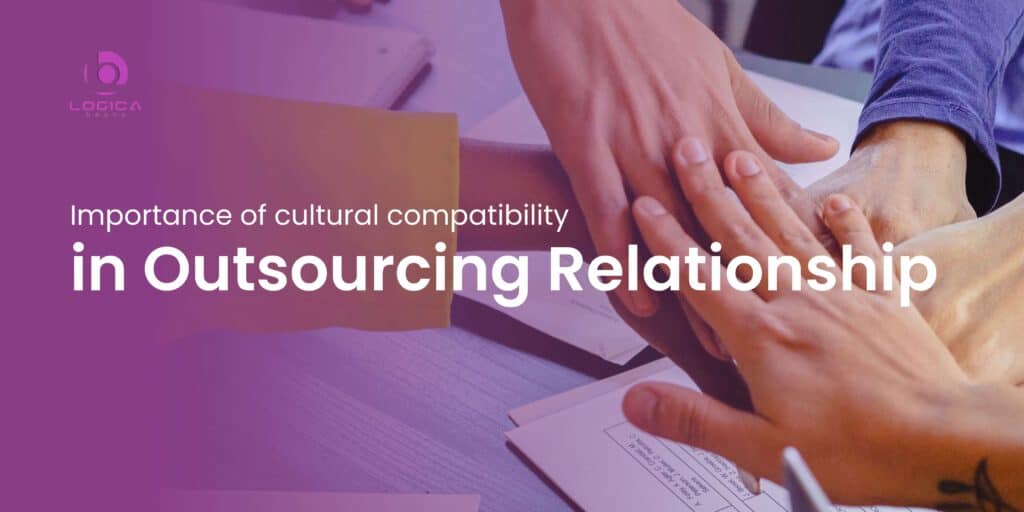Cultural compatibility is a crucial aspect to consider when outsourcing relationships. It refers to the degree to which the values, beliefs, and communication styles of the outsourcing partner align with those of the company.
In this blog post, we will explore the different aspects and importance of cultural compatibility in outsourcing relationship. We will also discuss strategies for assessing and improving cultural compatibility in outsourcing relationships.
In today’s globalized business environment, companies often outsource certain aspects of their operations to partners in other countries. This can be cost-effective solution for many businesses, but it also poses a number of challenges. One of the most significant challenges is ensuring cultural compatibility between the company and the outsourcing partner. Without it, there may be misunderstandings and miscommunications that can lead to delays, error, and other problems.
Cultural compatibility is especially important in outsourcing relationships because it affects not only the day-to-day interactions between the company and the outsourcing partner, but also the long-term success of the partnership. A lack of cultural compatibility can lead to dissatisfaction on both sides, which can ultimately result in the termination of the outsourcing relationship. On the other hand, a high degree of cultural compatibility can lead to a strong, productive partnership that benefits both parties.
What is cultural compatibility?
Cultural compatibility refers to the degree to which two or more individuals or groups share similar values, beliefs, and customs. It is often considered in the context of interpersonal relationships, such as marriage or business partnerships, as well as in the context of multicultural societies. Cultural compatibility can play a role in determining the success or failure of a relationship or interaction.
Not only in outsourcing but also in workplace, cultural compatibility is very much important as it can affect communication, collaboration, and productivity among employees from different cultural backgrounds.
Cultural compatibility is not always easy to assess, as it can be influenced by a wide range of factors, including language, customs, beliefs, and values. It is also important to note that cultural compatibility does not necessarily mean that two individuals or groups must be from the same culture or have identical beliefs. Instead, it is about understanding and respecting differences while also finding common ground.
Cultural Compatibility in Outsourcing Relationship
Cultural compatibility is considered one of the most important aspects while outsourcing the business as it can affect the success of partnership and the quality of the work produced. Outsourcing relationships often involve individuals or teams from different cultural backgrounds working together, and a lack of cultural compatibility can lead to misunderstandings, delays, and a lack of trust.
To ensure cultural compatibility in outsourcing relationships, both parties should make an effort to understand and respect each other’s cultural backgrounds and communication styles. This can include providing cultural training, setting clear expectations, and having open and transparent communication.
It is also important to establish a clear and effective communication channel, as well as to establish a common understanding of the business and project objectives. Moreover, having a clear project management plan and a defined process can also help mitigate cultural differences, and ensure that the outsourced work is delivered on time, within budget and with high quality.
Cultural compatibility is a key factor in ensuring a successful outsourcing relationship. Both parties should make an effort to understand and respect each other’s cultural backgrounds, and to establish clear communication and expectations.
Some of the common issues that can arise in outsourcing relationships due to cultural differences includes:
● Communication problems
Different cultures may have different communication styles and expectations, leading to misunderstandings and confusion. some cultures may have a more indirect communication style, where they may not speak directly or may use subtle cues to convey a message. This can lead to confusion for individuals from cultures with a more direct communication style.
Some cultures may have different expectations around formality and politeness in communication, which can also lead to confusion. To mitigate these issues, both parties should make an effort to understand and respect each other’s communication styles and expectations. This can include providing cultural training, setting clear communication guidelines, and being open to feedback.
● Time management: Different cultures may have different attitudes towards punctuality, deadlines, and work-life balance.
● Decision-making: Different cultures may have different ways of making decisions, leading to conflicts or delays.
● Management styles: Different cultures may have different management styles and expectations, leading to conflicts or misunderstandings.
Importance of Cultural Compatibility in Outsourcing Relationships
When it comes to cultural compatibility, it is one of the crucial aspects of outsourcing relationships as it can greatly impact the success of the partnership. When both parties in an outsourcing relationship share similar cultural values, and norms, it can lead communication, increased trust and understanding, greater flexibility, and more efficient process.
Cultural Compatibility affects the quality and success of the business relationship between two parties. Misunderstandings and communication issues can arise if there are cultural differences, leading to difficulties in setting expectations and meeting project goals. A compatible cultural relationship helps build trusts, enhances collaboration, and leads to smoother process, resulting in a more successful outsourcing experience.
Increased flexibility and adaptation in corporate operations can also result from cultural compatibility in outsourcing. Service providers that understand and respect to the outsourced company’s culture and values are capable of quickly adjusting to shifting demands and specifications, which results in more effective business operations.
Cultural compatibility is a critical factor in outsourcing as it helps to ensure a positive working relationship and a successful project outcome. Cultural differences can create challenges in communication, negotiation, and collaboration, but a compatible cultural relationship can lead to improved communication, increased trust and better team work, and a more efficient and effective project.
Down below are the importance of cultural compatibility in detail.
● Improved Communication: When both parties in an outsourcing relationship share similar cultural values and norms, it can lead to better communication and more effective collaboration. This can make it easier to understand each other’s perspectives and to resolve any issues that may arise.
● Increased trust and understanding: When there is cultural compatibility, both parties are more likely to trust and understand each other. This can lead to a more positive and productive working relationship, which can help to ensure the success of the outsourcing partnership.
● Greater flexibility: With cultural compatibility, both parties are more likely to be open to different ways of doing things, which can lead to greater flexibility and adaptability in the outsourcing relationship.
● Increased efficiency: When both parties in an outsourcing relationship share similar cultural values and norms, it can lead to more efficient and streamlined processes, as there is a better understanding of what is expected and less time is spent on misunderstandings.
● Increased satisfaction: When there is cultural compatibility, both parties are more likely to be satisfied with the outsourcing relationship, which can lead to increased commitment and a more long-term partnership.
● Better problem-solving: Cultural compatibility can lead to better problem-solving and decision-making, as both parties are able to understand each other’s perspectives and have a better understanding of how to approach and solve problems.
● Greater cultural awareness: When working with a culturally compatible outsourcing partner, both parties can gain a greater understanding and appreciation for different cultures, which can lead to increased cultural awareness and sensitivity.
● Better quality of work: Cultural compatibility can lead to better quality of work, as both parties have a better understanding of what is expected and can work together more effectively to achieve common goals.
● Cost savings: Cultural compatibility can lead to cost savings, as there is less time and resources spent on communication and problem-solving, which can lead to more efficient and streamlined processes.
● Greater sense of belonging: Cultural compatibility can lead to a greater sense of belonging and shared identity, which can enhance the sense of community and teamwork between the parties involved in the outsourcing relationship.
It’s important to note that cultural compatibility is not only about the similarities in culture but also the readiness of both parties to understand and appreciate the differences, and to navigate them in a positive and effective way. As such, it is also important to provide cross-cultural training and communication strategies and know why cultural compatibility important in outsourcing relationships.
How cultural compatibility can include improve communication and collaborating in outsourcing relationships?
Communication is the backbone of any relationship, and outsourcing relationships are no exception. Cultural compatibility is an important factor in the success of outsourcing relationships as it can greatly impact communication and collaboration between the parties involved.
Cultural compatibility also leads to increased trust and understanding, which can foster a more positive and productive working relationship. In terms of collaboration, cultural compatibility enables both parties to have a shared perspective on how to approach and solve problems, and to navigate cultural differences in a positive and effective way, leading to greater flexibility and adaptability in the outsourcing relationship.
In order to ensure the success of the outsourcing relationship, it is important to consider cultural compatibility when selecting an outsourcing partner and to implement cross-cultural training and communication strategies to enhance the compatibility.
Let’s talk about how cultural compatibility can include improve communication and collaborating in outsourcing relationships.
● Shared understanding of communication styles: When both parties in an outsourcing relationship share similar cultural values and norms, they are more likely to have a shared understanding of how to communicate effectively. This can make it easier to understand each other’s perspectives and to resolve any issues that may arise.
● Better use of language: When both parties share a common language, it can improve the efficiency and effectiveness of communication, and can reduce the risk of misunderstandings.
● Increased trust: When there is cultural compatibility, both parties are more likely to trust and understand each other. This can lead to a more positive and productive working relationship, which can help to ensure the success of the outsourcing partnership.
● Greater flexibility: With cultural compatibility, both parties are more likely to be open to different ways of doing things, which can lead to greater flexibility and adaptability in the outsourcing relationship.
● Greater understanding of cultural nuances: When working with a culturally compatible outsourcing partner, both parties have a better understanding of cultural nuances and are more able to navigate cultural differences in a positive and effective way.
● Greater sense of belonging: Cultural compatibility can lead to a greater sense of belonging and shared identity, which can enhance the sense of community and teamwork between the parties involved in the outsourcing relationship.
● Shared norms and values: When both parties share similar cultural norms and values, they are more likely to understand and communicate effectively with each other. This can improve the efficiency of communication and reduce the risk of misunderstandings.
● Shared communication styles: Different cultures have different communication styles, and when both parties are culturally compatible, they are more likely to have a shared understanding of how to communicate effectively. For example, some cultures may prefer direct and assertive communication, while others may prefer indirect and polite communication. Understanding these cultural differences can help to avoid misunderstandings and to build effective communication.
● Shared language: When both parties share a common language, it can improve the efficiency and effectiveness of communication, and can reduce the risk of misunderstandings. This can also help to build trust and understanding between the parties.
● Increased trust: When there is cultural compatibility, both parties are more likely to trust and understand each other. This can lead to a more positive and productive working relationship, which can help to ensure the success of the outsourcing partnership.
In terms of collaboration, cultural compatibility can improve in following ways:
● Shared perspective: When both parties share similar cultural values and norms, they are more likely to have a shared perspective on how to approach and solve problems. This can lead to better problem-solving and decision-making.
● Greater flexibility: With cultural compatibility, both parties are more likely to be open to different ways of doing things, which can lead to greater flexibility and adaptability in the outsourcing relationship.
● Greater sense of belonging: Cultural compatibility can lead to a greater sense of belonging and shared identity, which can enhance the sense of community and teamwork between the parties involved in the outsourcing relationship.
● Increased mutual understanding and respect: When both parties have a greater understanding and appreciation for each other’s culture, it can lead to increased mutual understanding and respect, which can foster a more positive and productive working relationship.
Conclusion
Cultural compatibility is a vital aspect of outsourcing relationships as it can greatly impact the success of the partnership. When both parties share similar cultural values and norms, it can lead to better communication, increased trust and understanding, greater flexibility, and more efficient processes.
Cultural compatibility can also lead to increased satisfaction and a more long-term partnership. It is important for companies to consider cultural compatibility when selecting an outsourcing partner and to implement cross-cultural training and communication strategies to enhance the compatibility as there is lots of impact of company culture on the success of companies.










